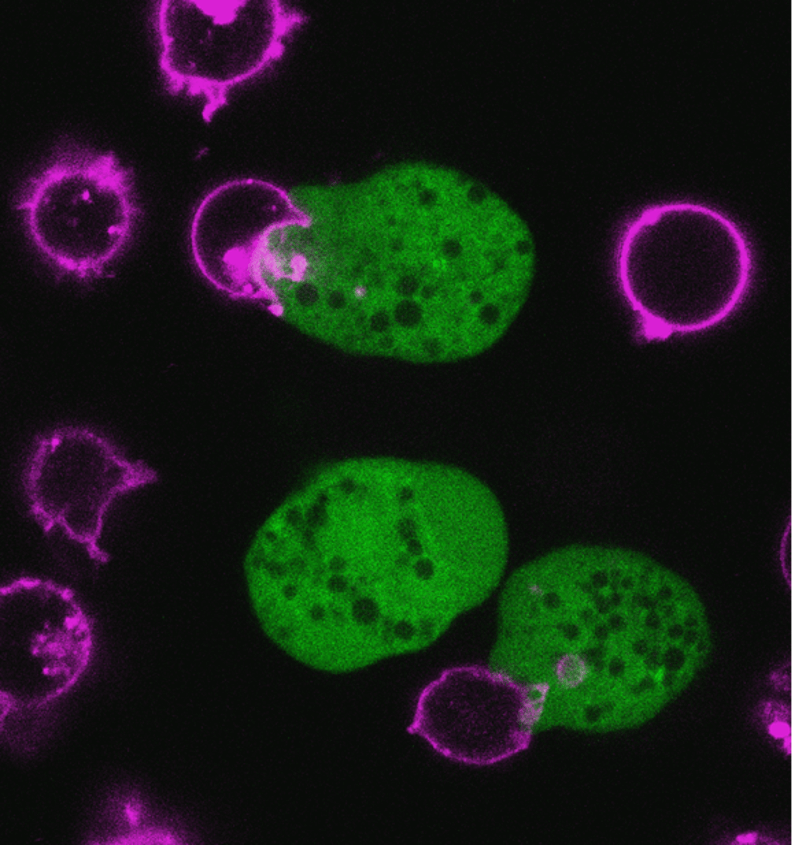Highlights:
- With the goal of democratizing healthcare, Imagia Canexia Health offers precision
oncology in a box, wrapped with services. - Small laboratories may not have the resources to leverage next generation sequencing for
cancer patients, but Imagia Canexia can help. - Deploying Imagia Canexia’s tech and support in low–resource settings can help people
with cancer get targeted treatment faster.
Imagia Canexia: Equalizing Access to Precision Oncology
A Conversation with Brady Davis and Vincent Funari
As the price of next-generation sequencing (NGS) technology drops, access increases. Yet even organizations able to make the investment in a sequencer can be paralyzed by how to get started with assays that they’ve never done before and—maybe more overwhelming—what to do once they’ve generated the boatloads of data that NGS offers.
Coping with the technical hurdles is just the first step, though. The real promise of NGS is precision medicine: genetic information that point clinicians toward tailored treatments that give patients the best shot. For cancer patients in particular, finding the right drug cocktail to treat their cancer is important, but doing so quickly can make all the difference. Several institutions have developed their own precision oncology programs; however, many of these resources are concentrated in the most populous urban centers, despite the fact that people everywhere get cancer.
Enter Imagia Canexia Health, a precision oncology company that offers sequencing, software, and machine learning tools to help labs worldwide develop and validate their own NGS assays and also provides the end-to-end support to ensure these platforms deliver relevant data quickly, in formats clinicians can use. We spoke with Imagia Canexia’s Chief Business Officer Brady Davis and Chief Scientific Officer Vincent Funari about their goal of making sure that everybody has equal access to cancer diagnostic testing and targeted therapies.
How did you get involved with Imagia Canexia Health?
Brady Davis: My background was as an exec at Illumina. Vince was an exec at NeoGenomics. We’ve got some pretty good experience in the world of genomics assays, diagnostics, cloud reporting, and healthcare.
In terms of oncology, I have some history there: parents with cancer, my child’s best friend growing up had a rare brain cancer called DIPG [Diffuse Intrinsic Pontine Glioma, an aggressive childhood cancer, which has a 0 percent survival rate]. Both Vince and I have experience in this space, so we’re really passionate about bringing diagnostic testing to everybody.
I like the model that the founders [of Imagia Canexia Health] had. They’re really strong scientists with oncology and AI and machine learning expertise, and they constantly ask the question, “Why doesn’t everybody have equal access to diagnostic testing around the world?” There is no reason why they shouldn’t.
Vincent Funari: Brady was the first person I got to talk to, and when I heard him talk about the company and its mission, I was sold. Coming from these giant [companies] that we were at before, and now, having this holistic, grounded approach, it’s just motivating every morning when we wake up and realize what we’re doing.
What does Imagia Canexia offer?
Brady: It’s like precision oncology in a box, wrapped with services. My interest is always in how you make the sequencing instrument more useful in the clinic and provide really accurate information to a doctor to make better decisions for a patient.
And this isn’t just services-based. We have developed some really cool barcoding technology and we have the ability to take less sample or degraded sample, whether it’s blood or tissue, and still get usable, accurate data out of it. And we can help analyze that data and see how to improve it.
Vincent: Even if you get a lab up and running with the bioinformatics, the tools, the reporting, there’s this big gap: how do you validate an assay? Small laboratories don’t have a lot of extra resources. So it’s helpful to have a partner who has been there and done it successfully in a big place where they had lots of resources to make mistakes and learn, so the partner lab doesn’t have to reinvent the wheel.
Bringing in our past experiences and being able to say, “This is how we did it in our lab here, and this is how we deployed over here. This is what we recommend for validation because we know that it’s going to cover New York State guidelines [for instance].” We know what they want because we’ve been successful previously.
What’s an example of the work that Imagia Canexia has done?
Imagia Canexia continues to collaborate with Thuy Phung, MD, PhD, a pathologist and the Director of Molecular Genetic Pathology and Dermatopathology at the University of South Alabama, to launch and grow a precision oncology program, the first of its kind in South Alabama. Watch Thuy speak about their partnership here.
Brady: The University of South Alabama is a great example because it’s a small lab. She has two people on her team. And as Thuy says, “It shows that if you can do it at the University of South Alabama, you can do it anywhere.”
When you send samples to a centralized lab, it can take weeks to get a result and start targeted therapy. If you can do it within two or three days, you could save a life, and we’ve got experience with that. We help them accelerate their ability do precision oncology locally.
Vincent: These customers really want to bring [NGS] in house for a number of reasons—one of the big ones being patient care. When they have direct oversight over patient care, it’s no longer this black box where they’re sending out patient samples and waiting.
If I’m an oncologist, I can go into the lab next door and talk to the director of pathology and ask questions. And the pathologist can follow up. They can monitor the patient, which they cannot do without the tools. Now they’ve got the tools.
What does the future of this work hold?
Brady: We’re seeing an incredible trend right now with pharma, where companies like Pfizer and Novartis are going to package up their whole portfolio of drugs and offer them at nonprofit pricing for developing countries.
You have cancer in those countries too, and one of the things that we’re seeing is there’s just not a low-cost diagnostic test to match you to those targeted therapies. If we can collaborate to deploy our testing, it could not only contribute to health equity in developing countries, we’re also going to see a lot of incredibly valuable data that are going to enable us to then develop more targeted therapies for all populations. And that’s really exciting to me.
Written by
Samba Scientific is a full-service, tactical marketing agency that specializes in helping growth-stage biotech companies communicate their science and stories, with an emphasis on qualified B2B lead generation. Our team of experts includes biologists, engineers, science writers and communicators, digital marketing experts, graphic designers, web developers, and experienced project managers.





